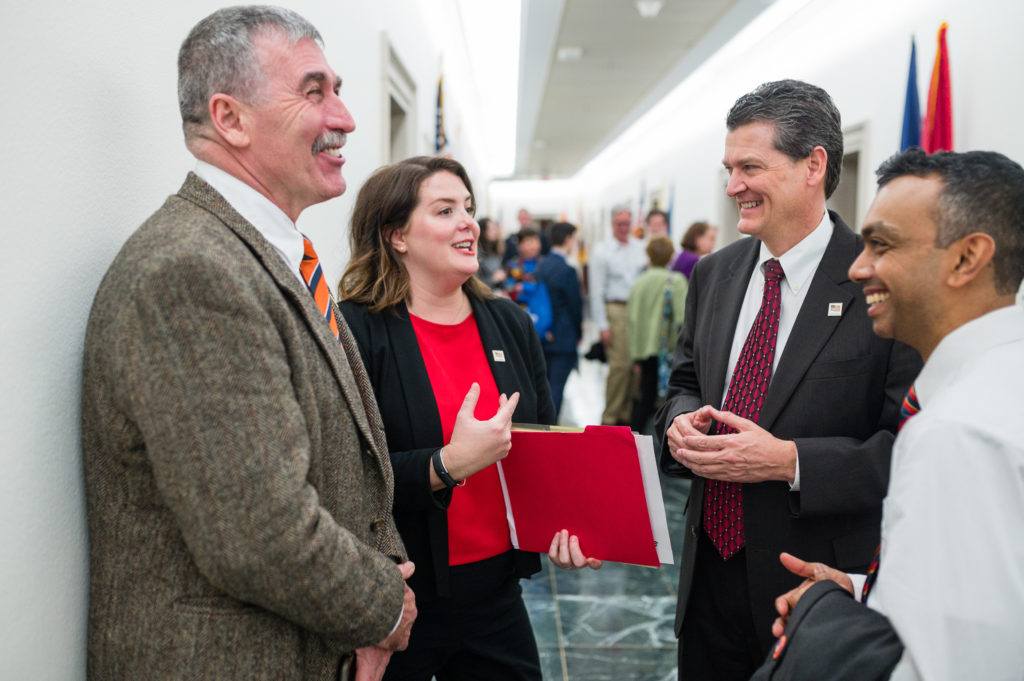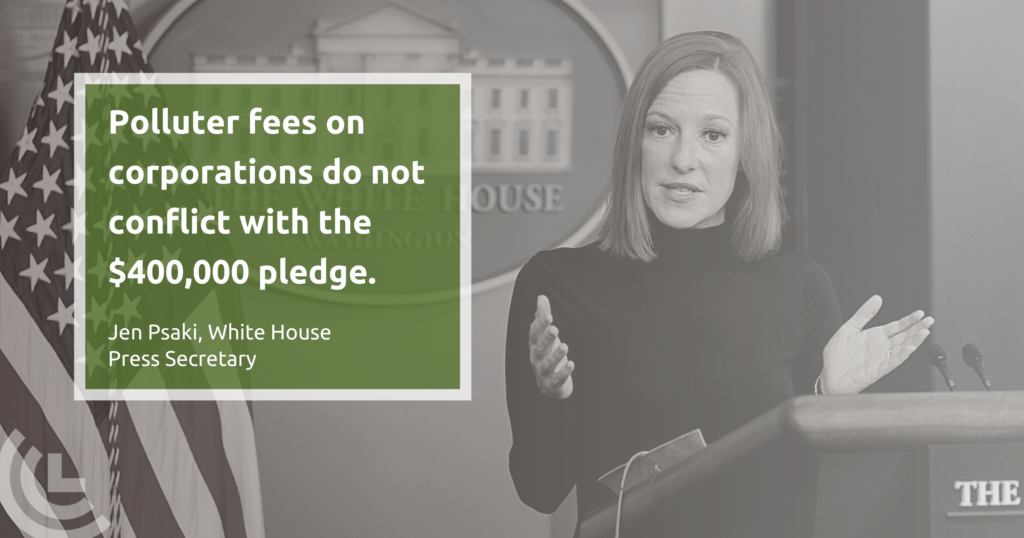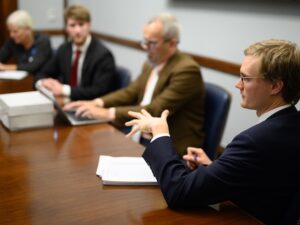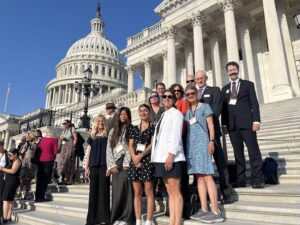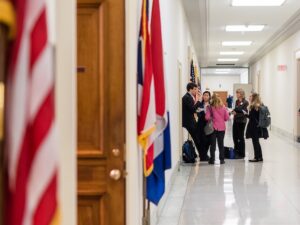Media reacts positively to carbon pricing
By Katie Zakrzewski
This is an exciting season here at Citizens’ Climate Lobby. The policy that CCL has been leading the charge on — carbon fee and dividend — is being seriously considered in Congress, it’s all over the news, and things are looking promising for it to advance! Danny Richter, CCL’s VP of Government Affairs, recorded a message for volunteers recently about what an incredible moment this is for our advocacy. Here are some of the many positive things that the media is saying about carbon pricing in the reconciliation process.
Senators fighting for a carbon price
Multiple media outlets have reported on carbon pricing discussions in the Senate, and these articles reveal just how serious key lawmakers are about including this policy in the budget reconciliation package.
The New York Times reported Sept. 24 that “Senator Ron Wyden of Oregon, the chairman of the Senate Finance Committee, confirmed that the Senate majority leader had asked him to craft legislation that would put a price on carbon emissions but to ensure that the policy would respect Mr. Biden’s pledge not to raise taxes on families earning less than $400,000. That could be done with some kind of rebate or ‘carbon dividend.’”
This comes after a Finance Committee document was released in early September, showing consideration of a rising carbon price paired with rebates for low-income taxpayers.
The New York Times story also highlighted Sen. Kyrsten Sinema’s awareness of climate concerns, showing that moderate Democrats are aware of how climate change is impacting their states. Sen. Sinema was quoted in The Arizona Republic saying, “In Arizona, we’re all too familiar with the impacts of a changing climate…from increasing wildfires to the severe droughts, to shrinking water levels at Lake Mead, damage to critical infrastructure — these are all the things that we’re dealing with in Arizona every day. We know that a changing climate costs Arizonans. And right now, we have the opportunity to pass smart policies to address it — looking forward to that.”
Bloomberg News included another quote from Wyden showing that, as his committee crafts carbon pricing language, they are staying cognizant of Americans’ energy prices. “It’s projected that making polluters pay — when combined with clean energy tax credits — would lower the cost of clean electricity for Americans,” Wyden told the outlet. “A ‘substantial portion’ of the revenue generated from a carbon tax would be disbursed to Americans in the form of cash payments,” the story also notes.
Bloomberg went on to report that even some moderate Republicans, such as Senator Lisa Murkowski (R-AK) and Senator Mitt Romney (R-UT) have expressed interest in a carbon price.
E&E Daily shared another quote from Wyden about the critical importance of effectively tackling climate change, in light of recent severe weather phenomena nationwide.
“If you’re really going to change behavior and combat this climate crisis — and my God, last few weeks have shown why this is urgent — you’ve really got to start with taxes and prices. That’s how you drive changes in behavior,” Wyden said during an E2 event. E2 is a business group, Environmental Entrepreneurs.
Senator Sheldon Whitehouse (D-RI), a longtime carbon pricing supporter and other Senate Democrats have continued to emphasize that carbon pricing is still important and is still on the table. The Washington Examiner quoted Whitehouse saying,“It is hard to lead the planet to safety without a carbon pollution fee that quickly reduces emissions and charges the fossil fuel industry, as market economics principles demand, for the damage the industry emissions inflict on our planet and economy.”
This policy is viable beyond the Senate, too — reporters asked White House Press Secretary Jen Psaki about it at a briefing on September 28. The President has pledged not to raise taxes on families making less than $400,000 per year, and Psaki confirmed that a carbon price paid by fossil fuel companies is in line with that pledge. Check it out:
Media acknowledging power and effectiveness of policy
Media outlets themselves are acknowledging the positive economic potential that carbon pricing has.
The New York Times reported, “Economists have said for decades that a carbon tax, which would make it more expensive to burn fossil fuels, is the most effective way to shift the economy toward wind, solar and nuclear power, which do not produce the emissions that are heating the planet.”
The outlet went on to quote Richard Newell, the president of Resources for the Future, which is a nonpartisan energy and environment research organization.“A price on carbon, such as a carbon tax, provides the economic incentive for the quickest, cheapest and most comprehensive emission reductions across the entire economy,” Newell said.
The New York Times concluded that, “[d]epending on how it is structured, a tax on carbon pollution could be the most powerful policy enacted by the United States to tackle climate change.”
Bloomberg News echoed the sentiments of The New York Times, stating that “economists have long favored a carbon tax as a straightforward approach to putting a price on the greenhouse-gas emissions,” while “advocates say it would encourage companies and consumers to pollute less.”
Bloomberg lists other reasons that a carbon price is important as well: a price on carbon “could draw more support as a way to replace other revenue raisers, assuage moderates’ concerns about the size of the package and give the Biden administration tangible proof of robust U.S. plans to slash greenhouse-gas emissions before a critical UN summit in five weeks.”
An article in the Washington Examiner reiterates that while a price on carbon itself is powerful, “…the policy could enhance rather than compete with Democratic policies headlining its climate push.” The outlet continued by sharing that carbon pricing has the potential to be the make-or-break policy in ensuring that the President meets his environmental goal of slicing carbon emissions in half by 2030. It’s great to see journalists themselves writing about the strength and efficacy of a carbon price as they cover this policy discussion in Congress.
CCL leads the way
Another exciting element of recent carbon pricing media coverage is that journalists are asking for input from Citizens’ Climate Lobby, as we have led the charge for a carbon price for years.
The New York Times quoted CCL’s Steve Valk when addressing concerns about Sinema. “I can tell you that our volunteers have placed 1,444 calls and emails to Arizona Senate and House offices in the last few months,” Steve said. Nationwide, CCL has generated more than 65,000 contacts to the Senate, House, and President about carbon pricing in recent months.
The Washington Examiner also quoted CCL’s Danny Richter discussing a carbon price in the context of other climate policy options. “It’s complementary to a lot of other policies. It plays well with others,” Danny said. “You get a lot of emissions reductions even at modest carbon prices.”
As the reconciliation process continues through the fall, we’re glad to see news outlets delve deeper into the positive potential of a carbon price, as well as reiterating just how impactful CCL’s volunteers are at moving policy in the national arena.

